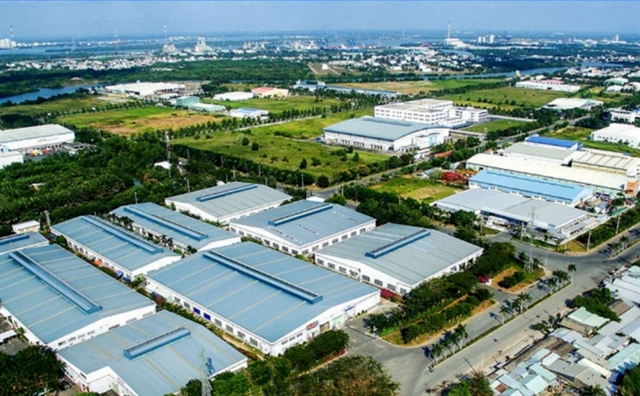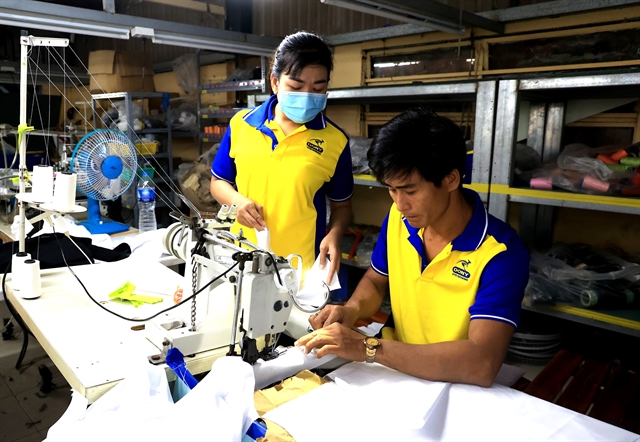HCM City has been proactively preparing and responding to the US reciprocal tariff challenge to maintain its 8.5 per cent economic growth target by the end of the year.

HCM City has been proactively preparing and responding to the US reciprocal tariff challenge to maintain its 8.5 per cent economic growth target by the end of the year.
According to the city’s Department of Industry and Trade, the US is the second largest export market for local businesses.
In 2024, HCM City’s exports to the US reached its highest level of US$7.4 billion, up 24.3 per cent year-on-year.
Products with high export turnover include computers, electronics, components, textiles and garments, machinery and footwear. HCM City also acts as an export hub for agricultural goods such as pepper, cashews, vegetables and seafood.
Nguyễn Văn Khánh, deputy chairman of HCM City Leather and Footwear Association, said that in the early months of this year when businesses had many orders, they purchased a great deal of materials for production activity.
The sudden proposed tariff was a huge shock for many. Several local businesses have had their orders postponed or were required to cover half of the tariff amount, and most of them are currently unable to get new orders.
Khánh said that the 90-day pause in the new tariff’s implementation had somewhat helped relieve local businesses’ worries. They were currently focusing on speeding up existing orders and making adjustments to their future production plans.
Phạm Văn Việt, management board chairman of VitaJean Co Ltd and deputy chairman of the HCM City Association of Garments, Textiles, Embroidery and Knitting, said that the 90-day pause was important for the textile and garment industry, as it would be a great opportunity for businesses to use up their materials and speed up production in the first half of the year.
They would also restructure their production plans depending on the negotiations between Việt Nam and the US.
HCM City agricultural goods exporters were also speeding up their deliveries, further showcasing how businesses were taking advantage of this 90-day period, he said.
Phan Minh Thông, board chairman of Phúc Sinh pepper and coffee export group, said that the US imported a great deal of pepper from Việt Nam and other countries.
The pepper industry remained optimistic that after the negotiation, reciprocal tariffs on agricultural products that do not compete with the US would enjoy a lower rate than average.
Phạm Bình An, deputy rector of HCM City Institute for Development Studies, said that local businesses needed to utilise the 90-day negotiation period to take advantage of trade opportunities and prevent trade disruptions, especially seasonal products such as textiles, garments and agricultural goods.

8.5 per cent target
Despite big challenges, HCM City is still aiming towards its economic growth target of 8.5 per cent for 2025.
Nguyễn Văn Được, chairman of HCM City People’s Committee (Administration), said that the city played a major role in the country’s economic growth as an export and commercial hub in the Southern region. As such, it had been preparing and offering support to local firms.
After the US tariff announcement, the city instructed departments and agencies to seek opinions of affected businesses and experts to evaluate the situation and draft response plans.
HCM City had been working closely with ministries and the Government, providing them with data to help with negotiations and help local businesses stay up-to-date.
It would restructure its trade facilitation programmes to focus more on markets that fit the current situation, he said.
Được added that the city would also strengthen public investment in traffic and logistics, implement demand stimulation and favourable loan programmes, and help businesses resolve production problems.
Professor Nguyễn Trọng Hoài at HCM City University of Economics said that while the negotiation would play a vital role, there were other ways to help the city grow more sustainably.
Businesses should focus more on diversifying their markets, and the city needed to speed up disbursement of public traffic infrastructure and logistics projects to reduce transport costs for businesses.
Nguyễn Minh Hà, rector of HCM City Open University, said that there were other unexplored markets such as the Middle East and African markets, and the city should help businesses seek new partners by connecting them with foreign trade networks, providing them with information and organising trade facilitation programmes.
Phạm Bình An said that Việt Nam should tighten rules of origin regulations and increase the rate of domestic materials to reduce reliance on imported machinery and materials.
On April 2, US President Trump announced a 46 per cent reciprocal tariff on certain goods imported from Việt Nam, the second highest among all exporting countries to the US. VNS





